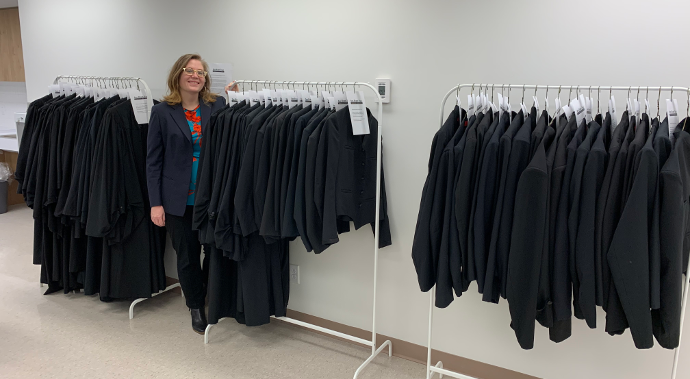Clothing new lawyers with care
Sarah Kent - 21 December 2020

Junior lawyers in Edmonton will literally be clothed in a reminder that their profession is about helping others thanks to the new Iris Barry Yake Memorial Robe Bank.
The robe bank was established in December by Moira Váně, ‘02 LLB, and is housed in the Barrister’s Lounge at the Edmonton courthouse. It was founded with 25 robes and 45 waistcoats, garments that are required when a lawyer appears for certain proceedings, including bar admissions.
The robes are expensive to buy, especially for soon-to-be lawyers who have just finished law school and their articles.
Although informal lending is not uncommon in the legal community, not all law students or junior lawyers are aware how commonplace it is, said Váně. She believes that the lack of awareness and embarrassment around financial struggles hold many lawyers back from reaching out to others to borrow robes.
“Having to shell out $1,500 for court clothes is a really difficult thing. That is a month’s rent or two [student] loan repayments,” said Váně. “It is really difficult to admit you don’t have money for these things.”
The robe bank allows lawyers to borrow court clothes on an honour system and is a touching tribute to Iris Barry Yake, ‘76 LLB, who never had the opportunity to wear her robes in court.
Yake’s robes were donated by her daughter, Susan Yake Phillippe, QC, BSc ‘73, who wore her mother’s robes for 30 years before receiving her silks as Queen’s Counsel in 2014. Phillippe’s bar call in 1983 was the first time her mother’s robes were worn into a courtroom, five years after her mother died.
Refusing to let barriers hold her back is a throughline of her mother’s experience, said Phillippe.
After her five children were established in school, Yake returned to school herself in 1971 to pursue a master’s in education and then applied to the Faculty of Law. She was initially denied admission to law school but successfully appealed the decision.
Shortly before graduating from the Faculty, Yake received a diagnosis of late-stage skin cancer.
She struggled to find articles and was granted permission from the Law Society of Alberta to commence the bar admission course in October 1976. Yake eventually secured articles with Harold (Hal) Veale, QC, ‘62 LLB, in late December, and with only three months of articling experience, she passed the bar exam in April 1977.
“A person couldn’t have worked any harder to reach that goal,” said Phillippe.
While Yake had passed the bar exam, she was too unwell to attend her bar call before she died in 1978 at the age of 49. She had purchased her robes in preparation for the ceremony.
“Sharing her story and knowing that people appreciate what she went through, I think is just a relief. It is a relief for the family. It is a relief for me,” said Phillippe. “I feel a great deal of gratitude that my mother is finally being recognized.”
When Váně approached Phillippe about donating court clothes to the project, Yake’s story of adversity struck a chord with Váně. “Our profession glorifies the overachievers when it is the hard-working unsung heroes that carry (all of) us on their shoulders,” she said.
Váně spearheaded the creation of the robe bank, yet the project has been supported by all levels of the profession, with retired lawyers and those elevated to the bench donating robes. One anonymous benefactor at the Court of Queen’s Bench paid for the robes and waistcoats to be drycleaned while another is contributing a plaque that tells the story of Yake.
Those special touches bring dignity and pride to borrowing the robes, said Váně.
The robe bank’s story has also influenced Váně’s colleagues in Calgary and Lethbridge to start collecting court clothes to create their own robe banks.
On top of helping young lawyers who take advantage of the robe bank, Váně hopes the project makes a difference to the legal community’s culture.
“Law is a profession with a lot of ego in it, and people are afraid to show vulnerability. It is a gift to let people help you,” said Váně. “We need to normalize caring for one another.”